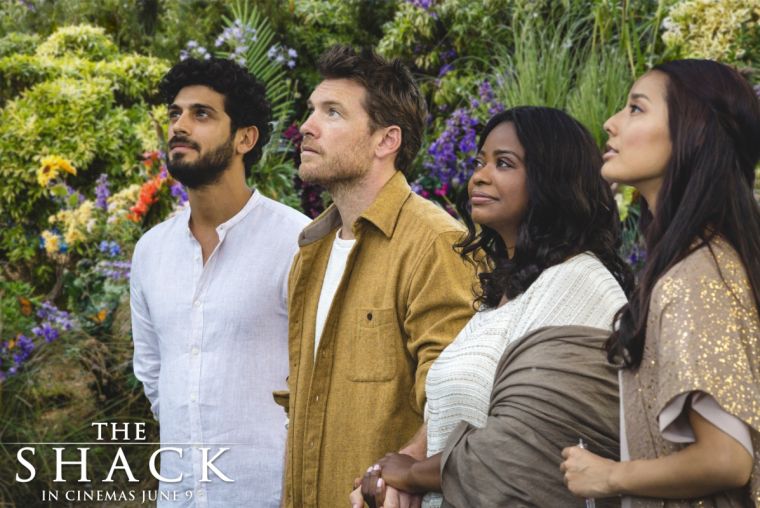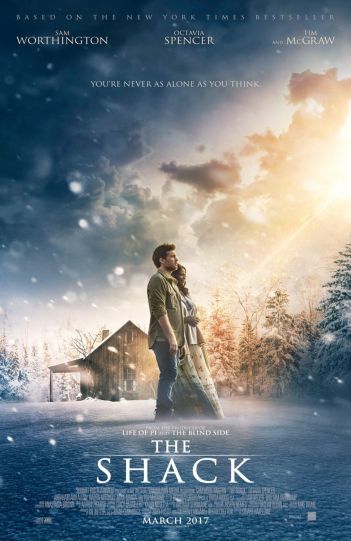'I'm not afraid of controversy': Exclusive interview with The Shack director Stuart Hazeldine

directorial assignments go, Stuart Hazeldine might have chosen easier material than The Shack. The source novel, which has sold over 22 million copies worldwide, isn't just somewhat controversial, it's also essentially a book about a man having conversations with humanised manifestations of the Holy Trinity. Yet despite the apparently un-cinematic concept, and the warnings from more conservative Christians to avoid anything Shack-shaped, British director Hazeldine's movie version has been a box office triumph. At time of writing, it's closing in on an impressive $100 million worldwide gross. Not bad for a film about supposedly-wonky theological discussion.
I meet Hazeldine in his favourite coffee shop, a boundary-retrieving throw from Lord's cricket ground in West London. He's in fine form, buoyed by a successful audience response that has ignored the less-than-kind critics, and he's eager to talk about his film despite spending the morning talking to Australian media ahead of The Shack's release there. As you might imagine for a director promoting his first major-budget movie, he's clearly remained heavily invested in the film long after the cameras have finished rolling.
He tells me that long before the opportunity arose to direct The Shack, a connection with a possible film adaptation had been in his orbit. 'I'd been offered the opportunity to adapt it into a film script years before,' he tells me, 'back when the book was just a two-million-selling hit. So I read it, and I loved the concept; your problem as a film-maker when you're dealing with God is that God is invisible, and film is a visual medium. Here was this concept that allowed you to actually visualise the Father, Son and Holy Spirit, and I thought that was catnip for a filmmaker with an interest in religious things.' However, he says it was also 'a very talky book', and he 'didn't have a strong vision for how it could be a movie.' He passed on the opportunity.
Clearly that wasn't the end of the story though, and the emergence of a working relationship with experienced Hollywood producer Gil Netter (Life of Pi, The Blind Side) eventually placed Hazeldine in an even more central role – as director, rather than screenwriter. He thinks that his own Christian faith 'definitely helped' to create a compelling movie, and that while there were other theological advisors on the movie, it was helpful that he as the director had that perspective too.
'The actors had to feel that I really understood the material,' he explains. 'Actors draw confidence from the director. There were other directors who were interested in the movie, but there were certain important theological aspects of the story that they didn't understand, and I think there was just a feeling that they wouldn't have been able to bring everything to the table that was needed.'
Given that theological awareness, I ask Hazeldine if he tried to mitigate some of the more controversial theology in the book. 'I wouldn't say we tried to meddle with it,' he replies, 'but I'd say we tried to focus and clarify in certain places. There's a lot of compression and conflation that happens when you adapt a book – a straight movie version of The Shack would be 10 hours long. So a lot of side avenues that the author had wandered down… we simply don't have time. We just follow Mack's central emotional journey, and his central issues with Papa (God the Father, played by Octavia Spencer).'

He sits up onto the edge of his chair at this point, as if suddenly remembering that he's cross about something. 'There was an element of straight racism in some people's issues with the material,' he says. 'And if someone has an issue with the fact that God is portrayed as a black woman, I don't really have time to engage with that kind of shallow objection. Because if you read the book, there's a perfectly reasonable explanation for why God might choose to present himself in such a way.
'What is the incarnation of Christ if it's not God making himself relatable to us? And if you really think that God is a white dude with a beard, then you have a whole other set of issues.'
He concedes though that he 'totally respects' many people's 'honest theological objections'. He says that even beyond its suffering theme, the big central question of the movie is: 'Who do you think God is?', and recognises that as a result, he was always going to be operating on contentious ground, especially working within a context that depicts the elements of the Holy Trinity side-by-side.
He has a theory about why the book has proved so uncomfortable for some: 'Many people see a disconnect between Jesus and the God of the Old Testament, but because they are worried about seeming unfaithful to God, they're very nervous about looking at any "thus sayeth the Lord" quote from the Old Testament and not believing it. So because they don't want to be like the serpent in the garden and ask "did God really say…?" what they try to do is hold in tension the Old and New Testament Gods and try to explain how they can both be true. And that's a theological game of Twister where you'll end up breaking some bones.
'Because there are quotes from God in the Old Testament that are diametrically opposed to things that Jesus says. Diametrically. In Isaiah God says "I create good and I create evil" (Isaiah 45:7). I create evil. The New Testament says that "In God is light and there is no darkness at all (1 John 1:5)." So how do you explain that? I just choose the safest ground of all, which is to follow the Word made flesh, rather than just the word.'
He's aware that his views might not endear him to those who found The Shack so uncomfortable in the first place. 'I'm not afraid of controversy,' he says. 'Controversy is a stop on the road to clarity, just like mistakes are often necessary on the road to success. Some people are scared of getting anything wrong – they want pure theology otherwise they won't engage with it. But we all have slight theological differences. We think we know what "biblical" is, but when you drill down into the details, we all see things slightly differently.'
Perhaps the most remarkable and unexpected thing about The Shack is Hollywood first-timer Avraham Aviv Alush's mesmerizing performance as Jesus. Hazeldine says that he made a conscious effort to 'strengthen' the role of Jesus in the film after a key criticism of the book that his role was somewhat diminished. 'It was important that Jesus was more accessible than the others, but we pushed that a little bit further by changing the way that Mack discovers the Shack. He meets Jesus first, so that he literally leads him into the presence of the Father..
'Then we needed to find the right guy. And Aviv was not just our first choice - he was our only choice. He stood head and shoulders above everyone else; he had this amazing smile and infectious warmth about him that both on a casting tape, and then in reality, just made everyone want to hang out with him. I loved the fact that we put the first Israeli Jew on screen as Jesus.'
Despite the critical response, The Shack doesn't feel like a 'faith-based movie' of the kind we've come to know in recent years. Hazeldine thinks 'some critics didn't like the sheer amount of theological stuff in the movie, and they just didn't care.' Audiences though have been much more positive: 'I think,' he says, 'it's because we had a very cinematic concept – the wish fulfilment of meeting God. It's primal. We had some really good writers, a producer with an amazing track record. And neither Gil nor myself saw this as "a faith-based movie". We didn't reference those other movies when we were filming; I don't think Gil or I have even watched any of them. So we were working to a different standard: we weren't making a Christian movie, we were just making a movie movie.'
As we finish, we talk a little bit about the darker side of a movie which doesn't hold back in showing a disturbing child abduction and its harrowing aftermath. He seems to think that to have left that out of the film would have been dishonest. 'I think that having honesty about the darkness of life is something that tends to go hand in hand with good art,' he says. 'It worked in the Psalms, it worked growing up for me in U2's music. I heard Bono sit with Eugene Petersen recently and say that a lot of music isn't honest enough, and how you've really got to sit with God and be honest about your pain and your frustrations.'
Hazeldine – who hopes his next project will be an adaptation of Charles Williams' Blitz-based ghost story All Hallow's Eve – confesses that he has always been a man who holds his faith and his frustrations in tension. 'I've always been hyper-honest as a believer,' he says, 'I've always asked questions; I used to storm out of Sunday sermons at my Baptist church when I was 15 or 16 and pace around in the side room arguing with God.' Perhaps it's no coincidence that he ended up making a film about a man wrestling with the biggest questions of all, and facing up to them right in the midst of his deepest darkness.
'I think that's something that The Shack does,' he concludes. 'Whether you agree with the answers or find them insufficient, it asks those questions and it at least attempts to give answers that might make you think. You can't make a Disneyfied version of Christianity in your art and expect it to come out well.'
The Shack is released in UK and Irish cinemas on June 9.
Martin Saunders is a Contributing Editor for Christian Today and the Deputy CEO of Youthscape. Follow him on Twitter @martinsaunders.











